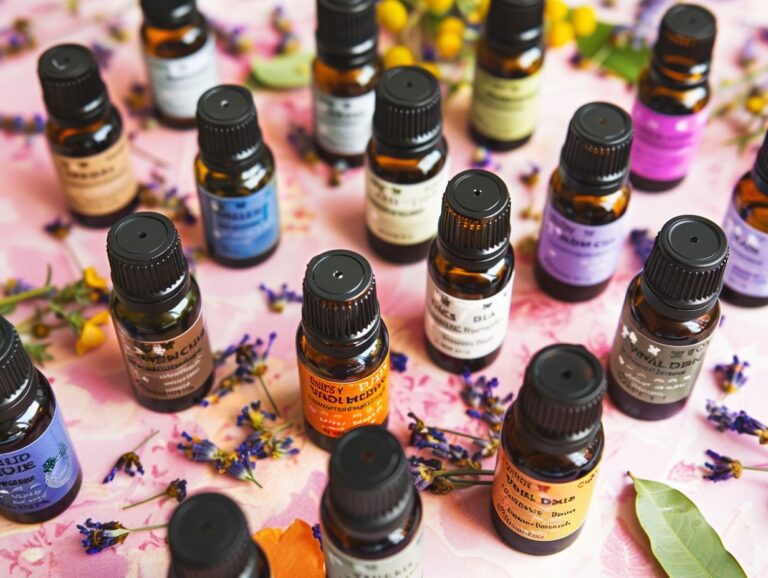What Essential Oils Should Not Be Diffused
Have you ever wondered about the benefits of diffusing essential oils in your home? While diffusing essential oils can have numerous health benefits, it’s important to be aware of the risks involved as well.
We explore the potential risks of diffusing essential oils, including allergic reactions, respiratory issues, skin irritation, and ingestion dangers. We will also discuss which essential oils should not be diffused, such as cinnamon, clove, and eucalyptus.
Learn more about the dos and don’ts of diffusing essential oils!
Key Takeaways:
What Are Essential Oils?
Essential oils are natural aromatic compounds found in seeds, bark, stems, roots, flowers, and other parts of plants. These oils are extracted through methods like distillation or mechanical pressing and are highly concentrated.
The extraction process of essential oils plays a crucial role in capturing their potent fragrance and therapeutic properties. Distillation is a common method where steam is used to extract oils from the plant material. On the other hand, mechanical pressing involves physically pressing the plant to release the oils.
Each essential oil has its unique source; for example, lavender oil is extracted from lavender flowers, while peppermint oil comes from the peppermint plant. This diverse range of sources contributes to the vast array of aromas and benefits offered by essential oils.
What Is Diffusing Essential Oils?
Diffusing essential oils involves dispersing the concentrated aromatic molecules of the oils into the air, usually through a diffuser device. This process allows the oils to be inhaled and absorbed by the body.
Inhalation and diffusion play a vital role in delivering the therapeutic benefits of essential oils. When inhaled, the aromatic molecules stimulate the olfactory system, influencing the brain’s limbic system that controls emotions and memory. This leads to various physiological and psychological effects, such as stress relief, improved mood, and relaxation.
There are different types of diffusers available, including ultrasonic, nebulizing, heat, and evaporative diffusers. Each type has its unique way of dispersing oils into the air, with ultrasonic diffusers being popular for their ability to maintain the oil’s properties through a mist. Nebulizing diffusers, on the other hand, deliver a more concentrated dose of oils without heat or water, making them ideal for therapeutic use.
What Are The Benefits Of Diffusing Essential Oils?
Diffusing essential oils can offer a wide range of wellness benefits, including promoting relaxation, improving sleep quality, boosting mood, and enhancing cognitive function.
Essential oils have been found to have a soothing effect on both the body and mind. For instance, the calming scent of lavender oil is known to reduce stress levels and promote relaxation, making it an excellent choice for winding down after a long day.
Regarding immune support, oils like tea tree and eucalyptus are commonly used for their antimicrobial properties. These oils can help purify the air and support a healthy immune system, especially during cold and flu season.
For mental clarity and focus, peppermint oil is a popular choice. Its invigorating aroma can help enhance alertness and concentration, making it ideal for study sessions or work environments.
What Are The Risks Of Diffusing Essential Oils?
While diffusing essential oils can have therapeutic effects, there are risks associated with improper use. It is essential to follow safety precautions, including proper dilution and understanding potential adverse reactions.
One of the key safety considerations when utilizing essential oils is dilution. Undiluted oils may cause skin irritation, allergies, or even respiratory issues. Properly diluting essential oils in a carrier oil can help mitigate these risks.
Consulting with a healthcare professional before incorporating essential oils into your routine is advisable, especially if you have pre-existing medical conditions or sensitivities. Conducting a patch test on a small area of skin can help determine any potential allergic reactions before widespread application.
Allergic Reactions
Allergic reactions to essential oils can manifest as skin rashes, itching, hives, or respiratory symptoms such as coughing or wheezing. Individuals with known allergies should exercise caution when using diffused oils.
There are different types of allergic reactions that individuals may experience when exposed to essential oils. Some common symptoms include redness, swelling, or a burning sensation on the skin. Respiratory symptoms can range from mild irritation to difficulty breathing. Factors such as pre-existing allergies, skin sensitivity, or underlying health conditions can increase the risk of experiencing an allergic response. It is crucial to identify and avoid oils that trigger allergies. Examples of essential oils known to be allergens include lavender, eucalyptus, and peppermint.
Respiratory Issues
Diffusing certain essential oils in poorly ventilated spaces can lead to respiratory symptoms like coughing, shortness of breath, or throat irritation. Proper ventilation and moderation in diffusion are essential to prevent such issues.
When essential oils are diffused into the air, the particles can be inhaled, potentially irritating the delicate tissues of the respiratory system. Proper ventilation allows for the dispersal and dilution of these oils, reducing the risk of respiratory discomfort. It is crucial to avoid prolonged exposure to highly concentrated essential oils to prevent overwhelming the respiratory system.
- One safe practice is to diffuse oils intermittently in well-ventilated areas, allowing the air to clear between sessions.
- Alternatively, consider lowering the concentration of oils being diffused to lessen the impact on the respiratory system.
By following these guidelines, individuals can enjoy the benefits of aromatherapy without compromising their respiratory health.
Skin Irritation
Direct contact with undiluted essential oils can cause skin irritation, redness, or burning sensations, especially in individuals with sensitive skin. Dilution and skin patch tests are crucial steps to prevent such reactions.
When using essential oils for diffusing, it’s essential to dilute them properly before direct application on the skin. The general recommended dilution ratio is 2-3 drops of essential oil per teaspoon of carrier oil. Carrier oils like almond oil, coconut oil, or jojoba oil work well to dilute essential oils, reducing the risk of adverse skin reactions.
Some essential oils are more likely to cause skin sensitivities, such as cinnamon bark oil, lemongrass oil, and oregano oil. Caution should be taken when using these oils, and they should always be properly diluted.
Performing a small skin patch test before applying any diluted essential oil to a larger area can help identify potential skin reactions. If any irritation occurs during the test, avoid using that particular oil or further dilute it before application.
Ingestion Dangers

Essential oils are highly concentrated extracts derived from plants and can be harmful when ingested in large amounts. The chemicals in these oils can irritate the digestive tract, harm the liver and kidneys, and even lead to seizures or respiratory distress.
To prevent accidental ingestion, always store essential oils out of reach of children and pets. Never use undiluted essential oils topically or orally without proper instruction from a qualified aromatherapist or healthcare provider.
If ingestion does occur, call Poison Control immediately for guidance. Do not induce vomiting unless advised by medical professionals, as this can further damage the digestive system. Provide as much detail as possible about the oil consumed for accurate treatment.
What Essential Oils Should Not Be Diffused?
Certain essential oils like lavender oil, known for their calming properties, can sometimes act as endocrine disruptors, potentially leading to hormone-related health complications if overused or inappropriately diffused.
Endocrine disruptors are chemicals that can interfere with the body’s endocrine system, responsible for hormone production and regulation. When these disruptions occur, they can have adverse effects on reproductive health, metabolism, and overall well-being.
In the case of lavender oil, although it is widely used for relaxation and stress relief, excessive inhalation or diffusion can disrupt hormone balance.
It’s crucial to use lavender oil and other essential oils mindfully. To avoid potential endocrine disruption, ensure proper ventilation when diffusing oils, dilute them appropriately, and limit exposure durations. It’s advisable to consult with a healthcare professional, especially if you have existing hormonal imbalances or sensitivities.
Cinnamon
Cinnamon essential oil should not be diffused extensively due to its potent nature, which can irritate mucous membranes and skin. Prolonged or high-intensity diffusion of cinnamon oil may lead to respiratory discomfort and skin sensitivities.
When diffused in large quantities, the strong aroma of cinnamon oil can be overwhelming and may trigger respiratory issues such as coughing, wheezing, or shortness of breath. Direct contact with undiluted cinnamon oil may cause skin irritation, redness, or even burns, especially for individuals with sensitive skin.
To minimize the risks associated with diffusing cinnamon essential oil, consider using it in a diluted form or opt for other methods of enjoying its benefits. Cinnamon oil can be applied topically when diluted with a carrier oil for a soothing massage or added to a warm bath for a relaxing experience without the potential drawbacks of diffusing.
Clove
Clove essential oil is not recommended for diffusion without proper dilution as it can cause skin irritation and sensitization. Inhalation of undiluted clove oil vapors can also lead to respiratory distress and allergic reactions.
It is crucial to adhere to safe practices when using clove essential oil in aromatherapy. Always dilute the oil properly before diffusing to avoid potential skin sensitivities and respiratory issues. Clove oil should never be applied directly onto the skin or inhaled in its concentrated form.
When selecting a carrier oil for dilution, opt for gentle options like coconut oil, almond oil, or jojoba oil to mitigate any adverse reactions. Remember to start with a low concentration of clove essential oil and gradually increase the strength as needed while monitoring for any signs of irritation or discomfort.
Oregano
Oregano essential oil is a potent antimicrobial with high phenol content, making it unsuitable for long-term or excessive diffusion. Inhalation of oregano oil may cause throat irritation, respiratory discomfort, and exacerbate asthma symptoms.
When diffusing oregano essential oil, it is crucial to consider the potency of the oil due to its strong antimicrobial properties. The high phenol content can lead to potential respiratory effects, especially when inhaled in concentrated form. To ensure safe usage, it is recommended to dilute oregano oil adequately before diffusion. A common dilution ratio is around 1-2%, meaning 1-2 drops of oregano oil per teaspoon of carrier oil or water.
- It is advised to limit the duration of diffusing oregano oil to short intervals of about 30 minutes to an hour at a time to prevent overwhelming the respiratory system with its potent properties.
- It is important to monitor for any adverse reactions and discontinue use if any discomfort or irritation occurs.
Lemongrass
Lemongrass essential oil is known for its uplifting aroma but can be irritating to the skin and mucous membranes if diffused without dilution. Prolonged exposure to undiluted lemongrass oil vapors may cause skin reactions and respiratory discomfort.
When diffusing lemongrass essential oil, it is crucial to dilute it with a carrier oil or water to minimize the risk of irritation. Dilution helps to reduce the potency of the oil, making it safer for use. It is recommended to diffuse lemongrass oil in well-ventilated areas and for limited durations to avoid overexposure.
For those with sensitive skin or respiratory issues, it is advisable to perform a patch test before using lemongrass oil. This involves applying a small amount of diluted oil to the skin to check for any adverse reactions.
While diffusion is a popular way to enjoy lemongrass oil’s fragrance, there are alternative uses that can also benefit from its properties. Mixing a few drops of lemongrass oil with a carrier oil makes a rejuvenating massage blend, or adding a drop to a warm bath can create a relaxing experience.
Peppermint
Peppermint essential oil should be diffused in moderation due to its menthol content, which can cause cooling sensations on the skin and mucous membranes.
When diffused in a controlled manner, peppermint essential oil can offer a range of benefits, from refreshing the air to promoting clarity and alertness. It is important to dilute the oil and avoid direct contact with the skin or eyes to prevent any potential irritation. Safe diffusion practices include using a quality diffuser, starting with a low concentration, and ensuring proper ventilation in the room. Prolonged exposure to undiluted peppermint oil through excessive diffusion can have adverse effects, such as headaches, nausea, or allergic reactions, so it is crucial to use it mindfully.
Wintergreen
Wintergreen essential oil contains methyl salicylate, a compound that can be toxic if inhaled in high concentrations. Diffusing wintergreen oil without proper ventilation or dilution may lead to headaches, nausea, and respiratory distress.
It is crucial to heed caution when using wintergreen essential oil for aromatherapy purposes due to the potential health risks associated with its primary constituent, methyl salicylate. Inhaling high levels of methyl salicylate through improper diffusion methods can result in severe symptoms such as dizziness, vomiting, and even organ damage.
To ensure safe usage, it is recommended to dilute wintergreen oil with a carrier oil before diffusing it. This not only helps to reduce the concentration of methyl salicylate but also prevents skin irritation that can occur with direct contact.
Eucalyptus

Eucalyptus essential oil is known for its decongestant properties and its ability to clear the respiratory tract, making it a popular choice for aromatherapy and cold relief. It is important to note that certain compounds in eucalyptus oil can be too potent when directly inhaled, leading to adverse reactions.
For individuals with respiratory conditions like asthma or allergies, inhaling eucalyptus oil may aggravate symptoms and should be done with caution. Similarly, pets, especially cats and birds, can be sensitive to essential oils, including eucalyptus.
- To mitigate risks, consider using alternative diffusion methods like diluting the oil with water before diffusing or opting for intermittent diffusion rather than continuous exposure.
- Ensure proper ventilation in the room and avoid direct inhalation of undiluted eucalyptus oil vapors.
Tea Tree
Tea tree essential oil is renowned for its antimicrobial properties but can be irritating when diffused undiluted. Direct inhalation of tea tree oil vapors may cause throat irritation, coughing, and exacerbate respiratory conditions.
Therefore, proper dilution is crucial before diffusing tea tree essential oil to avoid potential respiratory discomfort and skin sensitivities. The recommended concentration for safe diffusion is typically 1-2%, which equates to roughly 6-12 drops of tea tree oil per ounce of water in a diffuser. This helps to minimize any adverse reactions while still harnessing the oil’s beneficial properties.
Alternatively, you can combine tea tree oil with a carrier oil like coconut or jojoba oil for topical application, which is gentler on the skin. This can be particularly useful for addressing skin issues such as acne or fungal infections. Another option is to add a few drops of tea tree oil to a bowl of hot water for steam inhalation, providing relief for congestion and sinus issues without the risk of irritation.
Thyme
Thyme essential oil is potent and should be diffused sparingly due to its high phenol content. Prolonged or intense diffusion of thyme oil may cause skin sensitivities, throat irritation, and exacerbate respiratory issues.
When diffusing thyme essential oil, it’s crucial to consider the potential risks associated with its phenolic compounds. These compounds, such as carvacrol and thymol, can be irritating to the skin and mucous membranes if not properly diluted. To ensure safe usage, experts recommend diluting thyme oil at a ratio of 1-2%, especially when diffusing in enclosed spaces. This controlled dilution helps minimize the risk of adverse reactions and allows for a more gentle diffusion experience. It’s advisable to limit the duration of diffusion sessions to avoid overexposure to the oil’s potent properties.
Citronella
Citronella essential oil is commonly used as an insect repellent but should be diffused cautiously due to its strong aroma. Prolonged exposure to concentrated citronella oil vapors may cause respiratory discomfort and allergic reactions.
When using citronella oil for its insect-repelling benefits, it’s essential to practice moderation and ensure proper ventilation to minimize potential risks. To safely diffuse citronella oil, dilute a few drops in water before adding it to a diffuser. Avoid over-saturating the air with the oil, as this can lead to respiratory irritation.
Alternatively, you can apply diluted citronella oil directly to the skin as a natural insect repellent. Mix a few drops with a carrier oil like coconut or olive oil before applying to exposed areas. This method serves as a personal insect deterrent, offering protection without the need for diffusion.
Pine
Pine essential oil is refreshing and invigorating but should be diffused in well-ventilated spaces. Prolonged diffusion of pine oil may cause respiratory irritation and sensitivities, especially in individuals with asthma or other respiratory conditions.
When diffused safely, pine essential oil can offer a myriad of benefits. Its fresh, woodsy scent can uplift moods, enhance focus, and even act as a natural decongestant. The antimicrobial properties of pine oil make it a great choice for purifying the air in your living or workspace.
It is crucial to use it mindfully. To mitigate the risks associated with prolonged exposure, make sure to diffuse pine oil intermittently rather than continuously. Be mindful of the dilution ratio, as undiluted pine oil can be too potent for direct inhalation.
Sage
Sage essential oil is known for its cleansing properties but should be diffused in moderation due to its strong aroma. Prolonged diffusion of sage oil may cause respiratory discomfort and throat irritation in sensitive individuals.
When used properly, sage essential oil can offer a myriad of benefits. It is renowned for its ability to promote mental clarity and emotional balance, making it a popular choice for aromatherapy. By diffusing sage oil in controlled amounts, you can create a rejuvenating atmosphere that helps alleviate stress and anxiety.
It’s important to be mindful of the concentration of sage oil in the diffuser. Start with a few drops and adjust based on personal preference and sensitivity. Consider blending sage oil with other essential oils like lavender or bergamot to enhance its therapeutic effects.
If diffusion isn’t suitable, you can still reap the benefits of sage essential oil through topical application. Diluted with a carrier oil, it can be massaged onto the skin to soothe muscle aches or assist in skincare routines.
Lemon
Lemon essential oil is refreshing and uplifting but should be diffused in moderation to avoid skin sensitivities. Direct inhalation of lemon oil vapors may cause eye irritation and respiratory discomfort, especially in enclosed spaces.
Diffusing lemon essential oil can uplift your mood, boost energy levels, and promote mental clarity, making it a popular choice for aromatherapy. Its citrus aroma can create a fresh and invigorating atmosphere in your home or workspace.
It is important to dilute the oil properly before diffusing it and ensure good ventilation to prevent any potential adverse reactions. Learn which essential oils should not be mixed for safety.
When using lemon oil topically, always do a patch test on a small area of skin to check for any allergic reactions, and avoid direct sunlight exposure as it may increase skin sensitivity.
For safer diffusion practices, consider using a diffuser with a timer to control the duration of exposure and avoid diffusing for extended periods. Alternatively, you can add a few drops of lemon oil to a bowl of hot water for inhalation or mix it with a carrier oil for a soothing massage.
Orange
Orange essential oil is known for its invigorating scent but should be diffused cautiously due to its potential phototoxicity. Prolonged exposure to sunlight after orange oil application may cause skin sensitivities and increased risk of sunburn.
When diffusing orange essential oil, it is crucial to take necessary precautions to avoid adverse reactions. Always dilute the oil before using it in a diffuser to reduce the risk of skin irritation. It is advisable to use the oil in the evening or at night to minimize sun exposure after application.
To further minimize phototoxic reactions, it is recommended to use orange oil in products that are not meant to be left on the skin, such as candles, air fresheners, or cleaning solutions. This way, the risk of sun sensitivity is reduced while still enjoying the uplifting aroma of the oil.
Grapefruit

When diffusing grapefruit essential oil, it can help promote a clean and invigorating atmosphere, offering a mood-boosting effect. The citrusy scent can uplift spirits and create a bright ambience in your living spaces.
It is crucial to be aware of the potential risks associated with its phototoxic nature. To enjoy the benefits without the harmful effects, ensure dilution before topical application and always conduct a patch test prior to widespread use. Incorporating grapefruit oil in your skincare routine or diffusing it throughout your home can be a delightful experience when done safely.
Frequently Asked Questions
What Essential Oils Should Not Be Diffused?
There are several essential oils that should not be diffused due to potential health risks and adverse effects. These include:
- Clove oil
- Wintergreen oil
- Thyme oil
- Cinnamon oil
- Oregano oil
- Eucalyptus oil (for children under 10 years old)
- Tea tree oil (for pets)
Why should I avoid diffusing these essential oils?
Certain essential oils contain high levels of phenols, ketones, or other chemical compounds that can be toxic or irritating when inhaled in large amounts. Diffusing these oils can lead to respiratory issues, skin irritation, and other adverse reactions.
Can I still use these essential oils in other ways?
Yes, these essential oils can still be used topically or aromatically in small doses. However, it is important to dilute them properly and follow safety precautions, especially for those with sensitive skin or respiratory issues.
Are there any other oils I should be cautious about diffusing?
While the essential oils listed above are commonly known to be potentially harmful when diffused, it is always best to do your own research and check with a certified aromatherapist before diffusing any essential oil.
What should I do if I accidentally inhale too much of these essential oils?
If you experience any adverse reactions or discomfort after diffusing these essential oils, seek fresh air immediately and consult a healthcare professional for further advice.
Are there any safe alternatives for diffusing?
Yes, there are many safe and beneficial essential oils that can be safely diffused, such as lavender, peppermint, and lemon. It is important to always follow proper dilution and safety guidelines when using essential oils, regardless of whether they are being diffused or used topically.







